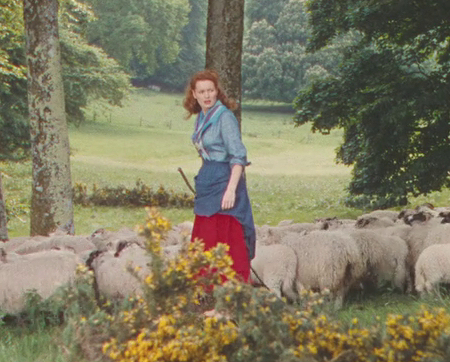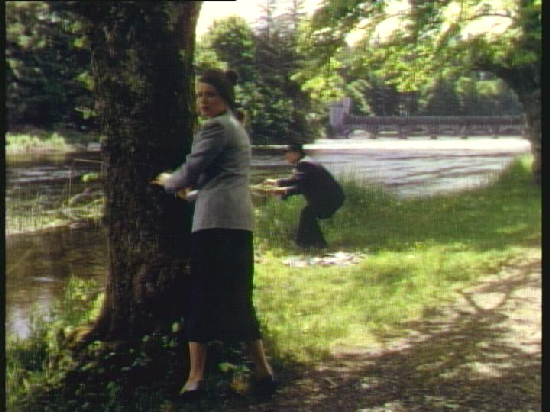Pure Quiet

It's here at last. I nearly cried just a few minutes in, watching the new Blu-Ray release of John Ford's The Quiet Man, which was released a few days ago along with a new DVD release. The difference here isn't merely from DVD to Blu-Ray quality. It's one of the most beautiful films ever shot and the 2002 DVD release, which has been the only DVD release until now, was a notoriously muddy, oversaturated transfer from VHS. The difference with this new release is so huge it's not even just a matter of aesthetics. There are shots where I was able to make out people's facial expressions for the first time.


These images are resized, so both screenshots have the same resolution, so the upgrade in quality you see above is unrelated to the fact that the new one is Blu-Ray. But on that note, here's a cropped portion of the image, unresized;

For the original DVD release from Artisan, the company was licensed the rights to the DVD release of the film by Paramount but for bizarre and complicated reasons I don't understand, were not given access to the original negative.


In his New York Post article about the new release from a few days ago, Lou Lumenick writes;
A few years ago I was interviewing John Ford's grandson and biographer, Dan Ford, in connection with Paramount's DVD reissue of "The Man Who Shot Liberty Valance.'' Towards the end, I asked him about his grandfather's masterpiece "The Quiet Man,''' which Paramount owned but at the time licensed to Lionsgate. As soon as Mr. Ford mentioned his displeasure with the ghastly Lionsgate DVD of that movie and started complaining about Paramount's stewardship, a studio publicist quickly cut off the interview on the grounds that it had gone "out of bounds.''


So who knows what kind of arcane bureaucratic bullshit was at fault here. This latest release is from a company called Olive, who I've never heard of. It has few special features, so one thing the old Artisan release has over it is Maureen O'Hara's really charming DVD commentary.


But, gods, this release is unquestionably a great thing.
In other movie news, my German friend Ada has pointed me to this interview with Quentin Tarantino from a German movie site, the first interview I've seen where he talks about the Nibelungenlied influence on Django Unchained;
Candyland ist der Hindarfjall, der Berg der Hinde, Stephen, die rechte Hand von Plantagenbesitzer Candie, ist der Drache, und die Ketten der Sklaven sind das Höllenfeuer. In einem der letzten Bilder im Film muss Django buchstäblich durch Flammen laufen, um zu seiner Broomhilda zu gelangen. Die Siegfried-Sage ist ein Spaghetti-Western!
Which google translates as;
Candyland is the Hindarfjall, the mountain of the Hinde, Stephen, the right hand of plantation owners Candie, the dragon, and the chains of slavery are the Hellfire. In one of the last images in the film Django must literally walk through fire to get to his Broomhilda. The Siegfried saga is a spaghetti western!
How great would it be if Tarantino makes a Nibelungenlied movie? Though it would be hard to compete with the Fritz Lang version.